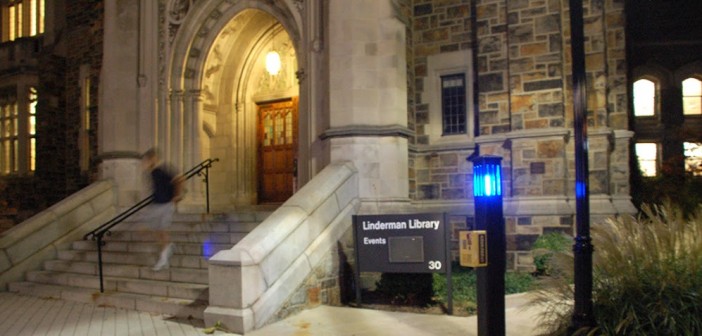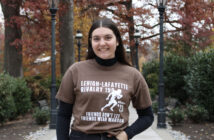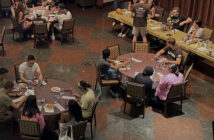The Lehigh Police Department-run escort system, though a long-standing measure of campus safety, continues to face ambiguity surrounding its offerings, as well as student expectations.
According to Lehigh Chief of Police Ed Shupp, misunderstandings about the escort service are not new occurrences. Perhaps the greatest student misconception is the very nature of the service, in that individuals think they will be driven to their destination.
“They think it’s a taxi service,” Shupp said. “(…) When people call and find out that it’s a walking escort, many times they say, ‘Well, I can walk alone.’”
Contrary to some student beliefs, the system is strictly a walking escort, where individuals can be accompanied by an officer, guard, event or department staff.
But even with the various sources by which an individual can be escorted, Shupp highlighted the importance of using the resources at hand.
The TRACS service, Shupp said, is the first safety measure by which students should seek to be accompanied when traveling between destinations. He noted the escort service is in addition to the TRACS system that is in place and that if a student requests an escort and the vans are running, the individual will be directed to utilize that resource instead.
“We try to utilize the tools that are out there already,” Shupp said. “That’s just a waste of resources when you already have a van that is driving in front of the library, or right in front of Dravo.”
Gorgi Pavlov, ’14, a current doctoral student, said that he had attempted to use TRACS prior to calling for an escort at 2 a.m., but was told by the driver that the ride was full, and he could not get one. After contacting a dispatcher via the Blue Light system, he was informed that he could not be provided an escort while the buses were still running.
“I don’t think students are well-informed about the escort service,” Pavlov said in regards to the system’s conditions.
Emily Levenson, ’16, said that she did not view TRACS and the escort service in the same way.
“Walking to TRACS itself isn’t the safest thing,” Levenson said. “A lot of the time you have to walk several blocks or several streets.”
Shupp said that when an escort is needed, an officer must be pulled from his regular patrol, as no one is on-call to receive and immediately respond to requests.
“Depending on the type of call an officer is on, a person could be waiting for a period of time,” Shupp said.
He also noted the need to prioritize call responses, as officers could be attending to other serious matters when they are dispatched to an escort-seeking student.
Pavlov said that in a situation where a student feels threatened and calls for an escort, but is then redirected, the time it takes to wait for the bus would make for an uncomfortable situation.
Lindsay Bailey, ’17, was surprised by a delay when she called in for an escort after she returned to campus around 2:00 a.m. after a day trip with friends. A resident of the Sayre Park apartments, Bailey said she was nervous about making the trip up to the top of campus alone. Her phone had also died at some point during the day, rendering her ability to use the “EmergenSee” application, or TRACS tracker, void.
Bailey used the Blue Light system outside of Taylor House to call in, and said she was fully aware that she would be walking home. She was under the impression that someone would be in a car beside her, she said, and that a feeling of safety was what she had wanted.
According to Shupp, the responding officers may ask general questions such as where the student is located, where they are going, their name and general information. He said that when a student calls in, the LUPD assumes that it is a matter of safety.
Bailey said that she was dispatched to an officer that asked her a series of questions, including why she was requesting the escort. When she tried to explain her whereabouts, the officer continued his inquiries.
“The reason I want an escort shouldn’t really matter,” she said. “You guys are touting that whenever someone feels uncomfortable, whether that’s in broad daylight or when it’s pitch black, that you would be there as a support system to get people from point A to point B.”
When a police vehicle approached Bailey’s area, she spoke to the officer at the wheel. She said that the officer appeared confused at her asking if he was her escort, which in turn, made her question where lines of communication may have gone awry.
The officer then told Bailey that he would not take her up to Sayre due to the fact that TRACS was running, she said. He then instructed Bailey to wait for TRACS, which turned into a 15-minute standby period.
Bailey voiced her frustrations over the situation and said that calling upon the system became such an ordeal that she considered forgoing an escort altogether, saying she would “take her chances” despite her fears. This action would have her acting against the system’s mission for safety.
However, despite this mindset, the boundaries of the service allow it to only extend as far as a few blocks off campus. The escort can only respond to calls from students who request it within the area, Shupp said, and used Third Street as an example of what falls outside of LUPD’s zone of operation.
Pavlov noted that he was not aware that the escort service was limited to a few blocks off campus, and said he felt as though the fact had not been communicated.
Levenson was also surprised by the reach of LUPD’s jurisdiction, and recounted her experiences this past summer. Levenson, who resided on Hillside Avenue, called the Lehigh police when she found herself being followed by a stranger. She was told that because her place of residence was not on university property, the campus police force could not help her. She was then advised to reach out the city of Bethlehem’s police force.
“I just assumed since Lehigh police is willing to go bust parties off campus, if someone is in danger off campus, they should be able to help them too,” she said.
According to Levenson, when the situation persisted and the stranger continued to follow her, she approached a patrolling LUPD officer who followed with her in his vehicle as she walked back to her home. The officer, she said, reminded her of her options and told her of the benefits that the escort service offered.
Shupp also highlighted the newly-introduced “EmergenSee” application, which he said should be thought of interchangeably with the service, as it is a virtual escort.
“I think it’s great that they’re making themselves accessible to everyone on their phone,” Levenson said, and also commended the LUPD on instilling a sense of safety with their constant presence on- and off-campus.
However, Pavlov questioned the application as a substitute for a live escort, noting the possibility of a something occurring in the time that may elapse between dispatch and police response. He would not feel safer, he concluded, in using the application in place of the escort system.
In regards to student opinion, Shupp said that he is unsure about feedback regarding the escort service. The protocol, he said, has been the same ever since the service began about 15 years ago.
“Safety is a partnership,” Shupp said to sum up the responsibility of both parties in keeping campus safe – that of the LUPD, and Lehigh’s students.
Echoing the sentiments of mutual involvement, Levenson suggested that there be increased advertising of offered safety services, or a first-year-targeted discussion on what the LUPD has to offer to make students feel secure, so as to make options clear from the start.
“If there was more awareness, maybe less bad things would happen,” she said.






Comment policy
Comments posted to The Brown and White website are reviewed by a moderator before being approved. Incendiary speech or harassing language, including comments targeted at individuals, may be deemed unacceptable and not published. Spam and other soliciting will also be declined.
The Brown and White also reserves the right to not publish entirely anonymous comments.